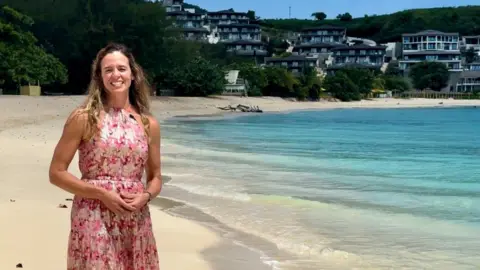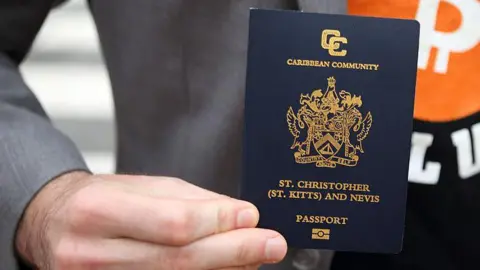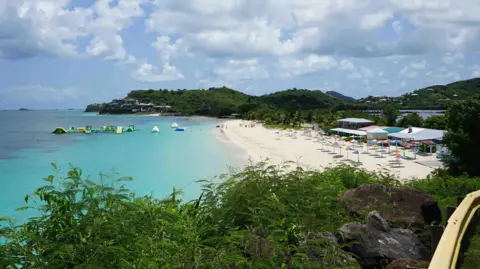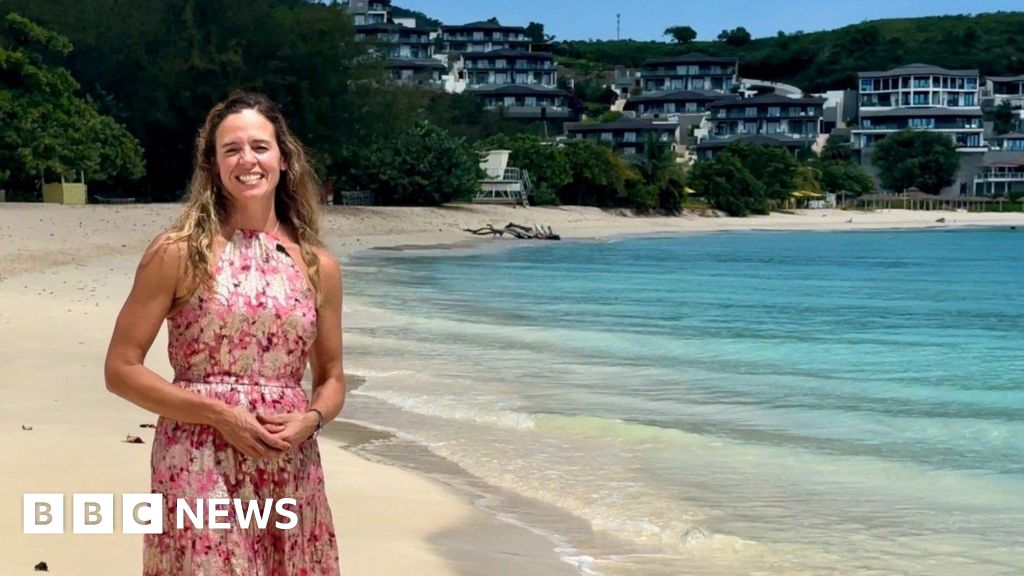Business Reporter
 Nadia Dyson
Nadia DysonNot only does it enchant the beaches while looking at homes for sale in the Eastern Caribbean, it’s not the laid back lifestyle advertised by buyers.
More and more property lists are also offering passports. And it is said that America’s political and social volatility is driving a surge in profits.
The five island nations of the region (Antigua and Barbuda, Dominica, Grenada, St. Kitts and Nevis, St. Lucia) offer such citizenship (CBI) by investments (CBI) from just $200,000 (£145,000).
When you purchase a home, you will also get a passport that allows holder visa-free access to up to 150 countries, including the UK and Schengen regions of Europe.
For the wealthy, there is no tax on island capital gains and inheritance, and in some cases there is no tax on income. And all five regional schemes allow buyers to maintain their existing citizenship.
In Antigua, real estate agents are struggling to keep up with demand, says Nadia Dyson, the owner of the luxury location. “Currently, up to 70% of all buyers want citizenship, with the majority coming from the US,” she told the BBC.
“We don’t talk about politics with them, but the unstable political landscape (US) is definitely a factor.
“Last year, it was all lifestyle buyers and some CBIs. Now they’re all saying, ‘I want a home with citizenship.’
Despite the lack of residential requirements for Antigua’s program, some buyers are considering moving full-time, Dyson adds:
US citizens have been a major part of the Caribbean CBI application over the past year, according to Henry & Partner, investigative immigration experts.
Ukraine, Turkey, Nigeria and China have offices all over the world, Ukraine, Turkey, Nigeria and China are one of the other most frequent countries of origin.
The overall application of the Caribbean CBI program has increased by 12% since the fourth quarter of 2024.
 Getty Images
Getty ImagesFrom gun violence to anti-Semitism, everything has Americans on Tenterhook. According to consultant Dominic Borek.
“In fact, 10-15% will move. Most of the time, it’s an insurance policy for what they’re worried about. Having a second citizenship is a good backup plan,” he explains.
Volek said the benefits of travel, which offers Caribbean passports appeal to businessmen, could also present security benefits. “Some US clients prefer to travel with Veniin’s passports more politically.”
Before Covid Pandemic, the US was not even on Henry’s “radar,” Volek continues.
Movement restrictions proved to be a “substantial shock” for the wealthy people who were used to travel freely on private jets, prompting the first surge in CBI applications in the state. Interest has been promoted again after the 2020 and 2024 US elections.
“There are Democrats who don’t like Trump, as well as Republicans who don’t like Democrats,” Borek says.
“For the past two years, we have zero offices in the US, so we have eight of all major cities and two or three more open in the coming months.”
Robert Taylor, a native of Halifax, Canada, has purchased an Antigua property and is planning to retire later this year.
He invested $200,000 just before the property threshold was raised to $300,000 last summer.
Being a citizen gives him the freedom to take advantage of business opportunities, he explains. “I chose Antigua because Antigua has beautiful water. People are very, very friendly and that means great weather later in my life.”
Still, such programs are not without controversy. When the sale of passports was first sold by the then anti-Gurua government in 2012 as a way to support the disease’s economy, some considered ethics a bit unfair.
The protesters took them to the streets in condemnation, recalled former chairman of House Speaker Gisele Isaac. “There was a sense of nationalism. People felt that we were selling our identity to people who, so to speak, didn’t know anything about us,” she says.
Other Caribbean leaders who do not provide CBIS have also been quickly criticized, including St. Vincent and Prime Minister Grenazin Ralph Goncalves. He previously stated that citizenship should not be “a product for sale.”

In the international community, there is fear that loose surveillance may help criminals pass through the borders.
The European Union has threatened to withdraw coveted visa-free access to CBI countries in the Caribbean, but the US has previously raised concerns about the possibility of a scheme that could be used as a means of tax evasion and financial crime.
A spokesperson for the European Commission told the BBC it has “supervised” five Caribbean schemes and has been discussing with their respective authorities since 2022.
She says she is trying to demonstrate whether citizenship through investment constitutes “abuse of the visa-free regime.
The committee has acknowledged the reforms implemented by the island and said it will affect its assessment.
On their part, the five Caribbean countries responded angrily to insist that they weren’t enough to scrutinise the applicants.
Dominican Prime Minister Roosevelt Skerlit described his country’s CBI program as “sounding and transparent,” adding that authorities worked hard to ensure its integrity.
The government says since the initiative began in 1993, passport sales have raised over $1 billion and paid for critical infrastructure, including cutting-edge hospitals.
In St. Lucia, Prime Minister Philip J. Pierre says the island adheres to the highest standards of security to ensure that the CBI does not inadvertently support illegal activities.
The need to appease the world’s superpowers by increasing income is the delicate balance of the small Caribbean country, with the small resources that rely on the whims of tourism.
The CBI program was labelled Lifeline at the Regional Industry Summit in April and is used for everything from cleaning after a natural disaster to reinforcement of the national pension system. Antigua Prime Minister Gaston Brown said the funds raised have returned from the brink of bankruptcy over the past decade.
Apart from purchasing real estate, other routes to Caribbean citizenship through investment usually include one-time donations to such as the National Development Fund. They range from $200,000 for one applicant in Dominican, $250,000 for a major applicant, and up to three eligible dependents in Dominican and St. Kitts. In Antigua, investors also have the option to donate $260,000 to the University of the West Indies.
In the face of international pressure, the islands have been working on new measures to strengthen surveillance, including setting standards, establishing local regulators to monitor operations and ensuring compliance.
Additionally, six principles agreed with the US include strengthening due diligence, regular audits, mandatory interviews with all applicants, and elimination of loopholes that previously allowed applicants to have previously refused to apply in another country.
Recently, passport sales account for 10-30% of the island’s GDP.
St. Kitts journalist Andre Huey says his country’s CBI scheme is “generally well supported” as a result. “The people understand its value for the economy and understand what the government can do with money.”

